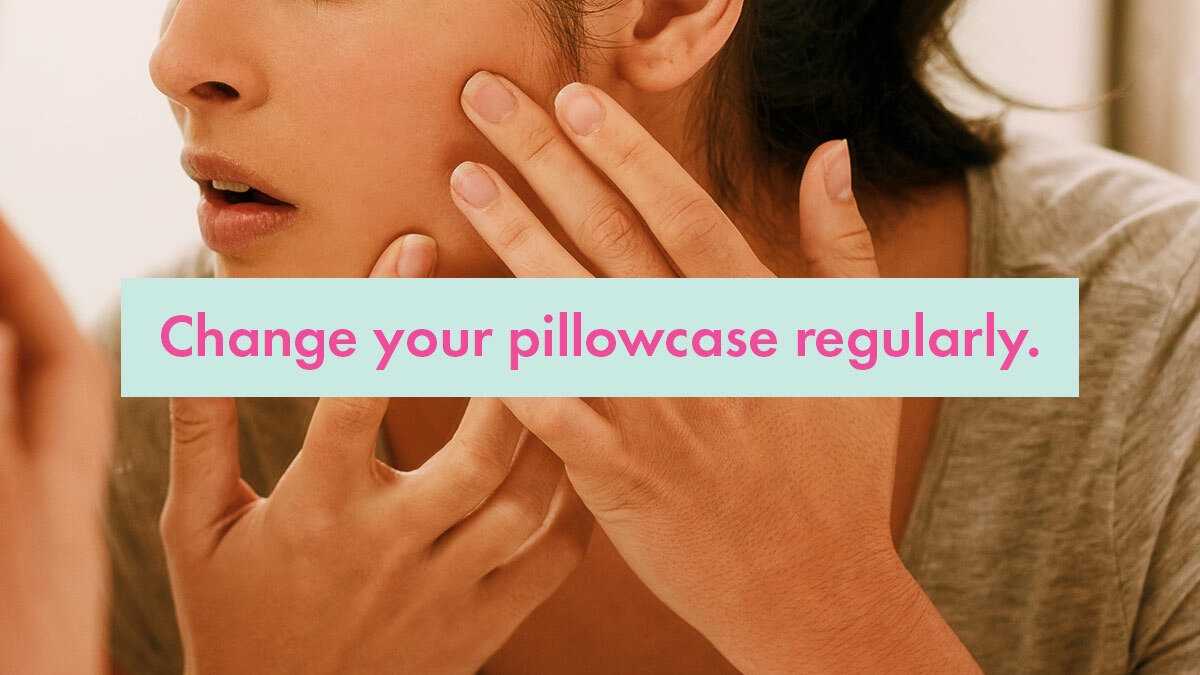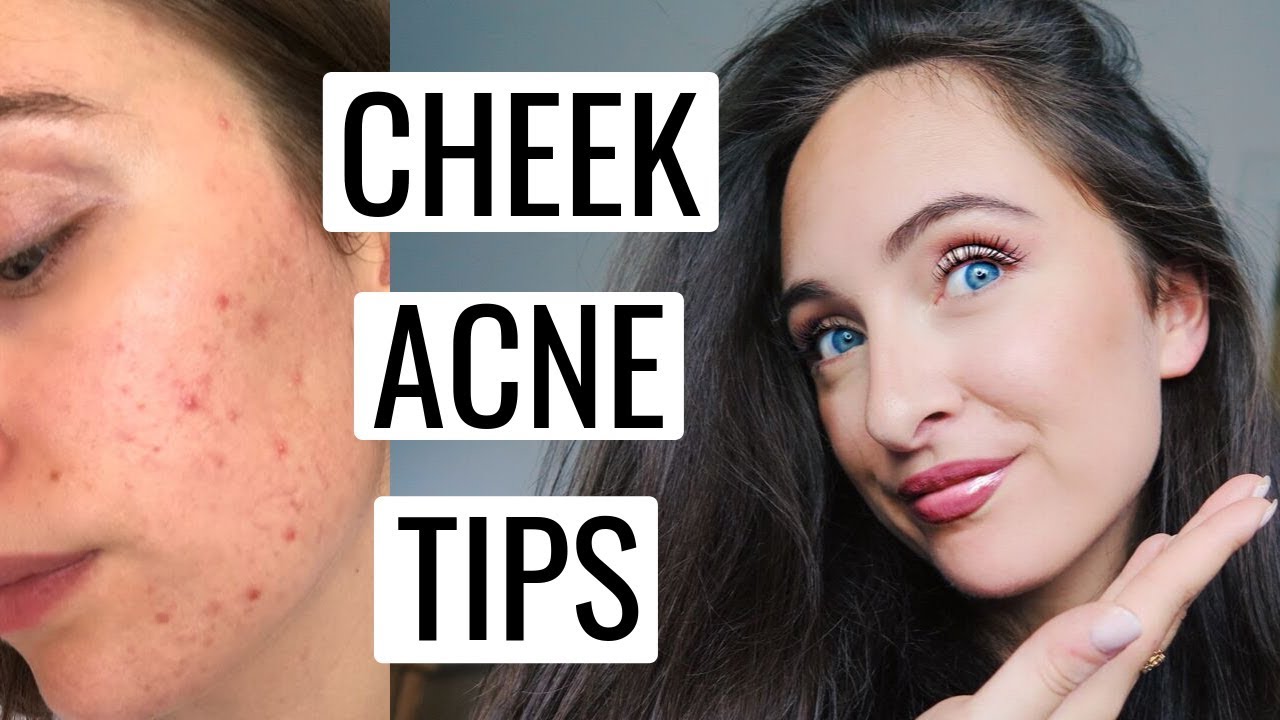To get rid of acne on cheeks, follow a skincare routine with gentle cleansers, topical treatments containing acne-fighting ingredients, and a moisturizer to keep the skin hydrated. Additionally, avoid touching your face and keep your hair and pillowcases clean to prevent bacterial buildup and irritation.

Credit: www.cosmo.ph
Causes Of Acne On Cheeks
Acne on the cheeks is a common issue many people face. One of the causes is hormonal imbalance, which can lead to increased sebum production. Poor skincare routine can also contribute, such as not cleansing the face properly or using harsh products.
Another factor is excessive oil production, which can clog pores and result in acne. It’s important to address these causes by maintaining a consistent skincare routine, including gentle cleansing and using non-comedogenic products. Additionally, adopting a healthy lifestyle with a balanced diet and regular exercise can help regulate hormones.
Remember to avoid touching or picking at the skin, as it can worsen the condition. Taking these steps can gradually reduce and prevent acne on the cheeks, leading to clearer and healthier skin.
Foods That Aggravate Acne
Acne on cheeks can be troublesome, but certain foods can worsen the condition. High glycemic index foods, such as white bread and sugary snacks, can trigger breakouts. Dairy products, including milk and cheese, may also aggravate acne due to their hormone content.
Fast food and processed foods, high in unhealthy fats and refined carbohydrates, can cause inflammation and clogged pores. To keep your skin clear, it’s important to avoid these acne-triggering foods and opt for a balanced diet with plenty of fruits, vegetables, whole grains, and lean proteins instead.
By making these dietary changes, you can improve your skin health and reduce acne on your cheeks. So, remember to be mindful of what you eat for healthier, clearer skin.
Skincare Tips To Prevent Cheek Acne
Skincare tips to prevent cheek acne include gentle cleansing, exfoliating regularly, and using non-comedogenic products. Cleansing the skin gently helps to remove dirt and excess oil without causing irritation. Regular exfoliation helps to unclog pores and remove dead skin cells, preventing the buildup of bacteria.
Choosing non-comedogenic products ensures that they won’t clog pores and cause acne. By following these skincare tips, you can effectively get rid of acne on your cheeks and maintain clear skin. Remember to cleanse gently, exfoliate regularly, and use non-comedogenic products for the best results.
Effective Natural Remedies For Cheek Acne
Effective natural remedies for cheek acne include tea tree oil, aloe Vera gel, and a honey and cinnamon mask. Tea tree oil possesses antimicrobial properties that can help reduce acne-causing bacteria on the skin. Aloe vera gel, known for its soothing properties, can calm inflammation and promote healing.
Honey and cinnamon, when combined, create a potent antibacterial and anti-inflammatory mask that can help unclog pores and reduce acne. Regularly applying these remedies to the affected areas can help clear up acne on the cheeks. It’s important to note that individual results may vary, and it’s always advisable to do a patch test before applying any new product to the face.
Embracing a consistent skincare routine and maintaining a healthy lifestyle can also contribute to reducing cheek acne. So, give these natural remedies a try and enjoy clearer, acne-free cheeks.
Diy Face Masks For Cheek Acne
Acne on the cheeks can be frustrating, but there are diy face masks that can help. One option is a turmeric and yogurt mask, which can reduce inflammation and brighten the skin. Another effective mask is made with oatmeal and honey, which soothes irritation and moisturizes the skin.
For a refreshing option, try a green tea and lemon mask, which can cleanse the pores and control oil production. These masks are easy to make at home and can be applied once or twice a week for best results.
Remember to always patch test new ingredients and ingredients for possible allergic reactions before applying them to your face.
Essential Oils For Cheek Acne
Cheek acne can be a frustrating issue to deal with, but essential oils can help. Lavender oil is known for its soothing properties and can reduce inflammation and redness on the cheeks. Peppermint oil has antibacterial properties that can help fight acne-causing bacteria.
It also provides a cooling sensation that can calm irritated skin. Rosemary oil has antioxidant properties and can promote clear, healthy skin. Additionally, it helps regulate oil production, which can prevent clogged pores and acne breakouts. These essential oils can be diluted with a carrier oil and applied to the cheeks using a cotton pad or your fingertips.
Incorporating these oils into your skincare routine can help you get rid of acne on your cheeks naturally. Don’t forget to patch test before using any new product on your skin!
Over-The-Counter Products For Cheek Acne
Acne on the cheeks can be frustrating, but there are effective over-the-counter solutions available. Salicylic acid cleansers are a popular choice for treating cheek acne as they help unclog pores. Benzoyl peroxide creams are another option, known for their ability to kill acne-causing bacteria.
For those looking to reduce acne scars and promote skin cell turnover, retinol serums are beneficial. When selecting these products, it’s important to start with low concentrations and gradually increase to avoid irritation. Additionally, it is recommended to cleanse the face twice a day, avoid touching the affected area, and use non-comedogenic moisturizers.
Remember that consistency is key, and results may take time. With the right products and skincare routine, you can successfully get rid of acne on your cheeks.
Topical Prescription Medications For Cheek Acne
Prescription medications are effective in treating acne on the cheeks. Topical antibiotics can help reduce inflammation and kill acne-causing bacteria. These antibiotics work by targeting the bacteria on the skin’s surface. Topical retinoids, such as tretinoin or adapalene, are another option.
They unclog the pores and promote cell turnover to prevent new acne formation. Azelaic acid creams are also beneficial for cheek acne. They reduce redness and inflammation while regulating the production of keratin, a protein that can clog pores. Remember to apply these medications as directed by your dermatologist to achieve the best results.
Regular use and patience are key when using topical prescription medications to get rid of acne on the cheeks.
Professional Treatments For Cheek Acne
Professional treatments such as chemical peels, microdermabrasion, and laser therapy can effectively address cheek acne. Chemical peels involve the application of a chemical solution to exfoliate the skin and reduce acne. Microdermabrasion uses tiny crystals to remove dead skin cells and unclog pores.
Laser therapy targets the bacteria and inflammation associated with acne, promoting healing. These procedures are performed by skilled professionals who can determine the best treatment option for your specific skin condition. It is important to consult a dermatologist or aesthetician before undergoing any professional treatment to ensure safety and effectiveness.
With the help of these treatments, you can say goodbye to acne on your cheeks and enjoy smoother, clearer skin.
Lifestyle Changes To Improve Cheek Acne
Lifestyle changes play a vital role in improving cheek acne. A healthy diet and staying hydrated are essential. Regular exercise and effective stress management are also beneficial. Getting enough sleep and following a consistent skincare routine are crucial steps. These lifestyle modifications can help prevent and reduce cheek acne significantly.
Making small yet meaningful changes to your daily habits can have a positive impact on your skin’s health. It’s important to remember that maintaining a healthy and balanced lifestyle is key to achieving clear, acne-free cheeks. By adopting these practices, you can improve the appearance of your skin and boost your overall well-being.
Start incorporating these changes today and say goodbye to cheek acne for good.
Dos And Don’ts For Managing Cheek Acne
Managing cheek acne requires following a few dos and don’ts.
- Firstly, it’s important to keep your hands and phones clean, as they can harbor bacteria that worsen acne.
- Secondly, resist the urge to pop or pick at acne, as it can lead to scarring and further inflammation.
Additionally, make sure to remove your makeup before going to bed to prevent clogged pores. By following these guidelines, you can effectively reduce acne on your cheeks and achieve clearer skin without any adverse effects.
Frequently Asked Questions
How Do You Get Rid Of Acne On Cheeks?
To get rid of acne on cheeks, establish a consistent skincare routine. Cleanse your face twice a day, exfoliate regularly, and use non-comedogenic moisturizers. Avoid touching your face, keep your hair clean, and avoid excessive sun exposure. If needed, consult a dermatologist for tailored treatments.
What Causes Acne On Cheeks?
Acne on cheeks can be caused by various factors. Hormonal changes, excess oil production, clogged pores, bacteria, and inflammation contribute to its formation. Certain irritants, such as dirty makeup brushes or harsh skincare products, can also trigger cheek acne.
Are There Any Home Remedies To Treat Cheek Acne?
Yes, there are several home remedies that can help treat cheek acne. Applying tea tree oil, aloe Vera gel, or honey on the affected areas may help reduce inflammation and kill bacteria. Additionally, maintaining a balanced diet, staying hydrated, and reducing stress levels can promote healthier skin.
Last Word
Achieving clear and healthy skin on your cheeks is possible with the right approach. By understanding the underlying causes of acne on cheeks and implementing a consistent skincare routine, you can effectively combat this common skin concern. Remember to cleanse your skin gently, exfoliate regularly, and moisturize to maintain a balanced complexion.
Incorporating natural remedies such as tea tree oil or aloe Vera can also be beneficial. Additionally, taking a holistic approach by managing stress levels, maintaining a healthy diet, and staying hydrated can contribute to overall skin health. Remember, patience is key when it comes to treating acne on cheeks, as results may take time.
With dedication and the right strategies, you can ultimately say goodbye to pesky cheek acne and hello to clear, glowing skin.

